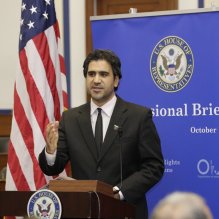International Dignitaries Rally for a New Iran Policy, Support NCRI as Democratic Alternative


By Dr. Majid Rafizadeh
On July 1, the streets of central Paris teemed with tens of thousands of Iranian dissidents, as a notable assemblage of A-list international dignitaries joined their ranks to advocate for the establishment of a free and democratic republic in Iran. Spanning a four-day period, the Summit assumed a weighty symbolic significance, as it dealt a substantial blow to the ruling ayatollahs in Tehran, leaving them profoundly humiliated. The event was billed as a momentous “political coup,” garnering considerable attention within Western media circles. Distinguished members of the foreign policy establishments in Washington and Europe, together with over 500 present and former officials and lawmakers, embarked on an unprecedented demonstration of support for the main opposition National Council of Resistance of Iran (NCRI). This profound alignment of influential figures is poised to shape the Western approach to the Iranian conundrum, leaving an enduring legacy.
Undeterred by the regime’s pressures, the event witnessed the presence of distinguished VIPs including former UK Prime Minister Liz Truss, 2024 presidential candidate Mike Pence, former Senator Joseph Lieberman, ex-House of Commons Speaker John Bercow, US national security adviser John Bolton, and a dozen sitting members of the US Congress from both parties.
Dubbed the “Free Iran World Summit 2023,” the gathering came at a critical juncture. Internally the ruling regime finds itself ensnared within a labyrinth of socio-economic crises, teetering on the precipice of an insurmountable impasse. Decades of economic mismanagement, unbridled state corruption, and extensive suppression have spawned an atmosphere rife with profound discontent. Such simmering frustration, manifesting in the form of increasingly fervent and protracted uprisings, stands as a poignant testament to the populace’s yearning for change.
The beleaguered regime frantically endeavors to sow confusion and obfuscate its domestic travails. Employing an intricate web of diversions, an elaborate propaganda apparatus is diligently orchestrated, aimed at discrediting the principal opposition while contriving pseudo “opposition” movements to facilely dismiss and quell dissent. However, the resounding success of the NCRI rally dashed Tehran’s campaign of disinformation and terror. It underscored an undeniable truth: the regime’s organized opposition is poised as a viable alternative-in-the-waiting.
The rally also showcased the impressive strength of the opposition on the domestic front. Messages were broadcast from over 10,000 dedicated Resistance Units—a cadre of indomitable activists operating covertly within Iran. These courageous teams undertake various anti-regime activities, including spearheading protests.
Former US Vice President Mike Pence, seized the moment to deliver a profound message: a meticulously organized, impeccably prepared, and profoundly qualified alternative known as the Mujahedin-e Khalq (MEK) stands ready to reshape the future of Iran.
But the rally was significant in more ways than one. Tehran, recognizing the potential potency of this summit, resorted to a deplorable strategy of blackmail and intimidation, seeking to coerce the French authorities into stifling the event. Paris police, succumbing to the regime’s pressure, sought to prohibit the rally. This only underscored the depth of the regime’s fear and desperation. It became abundantly clear that the NCRI rally posed a palpable threat to the regime, prompting them to resort to unjustifiable measures in a futile attempt to quell the voices of dissent.
Analysts have drawn connections between a 90-minute call between French President Emmanuel Macron and regime President Ebrahim Raisi on June 10 in which Raisi demanded the restriction of the resistance’s activities. Abdol-Reza Farajirad, the regime’s former ambassador to Norway and Hungary, confirmed that during negotiations for the release of French, Danish, and Iranian-Austrian prisoners in Iran, undisclosed agreements were reached pertaining to the control of opposition activities in Europe.
In the aftermath of these behind-the-scenes machinations, the regime and its media apparatus embarked on a self-congratulatory spree, heralding the French decision as a resounding “diplomatic victory” for Raisi.
The regime also exerted pressure on the Albanian government, with the aim of stifling the MEK at its headquarters near Tirana. In June, a force of over 1,200 police officers descended upon Ashraf 3, resulting in the tragic loss of a senior MEK member, numerous injuries, and the confiscation of computing equipment. Recent assertions made by a senior Iranian official on social media alleged that computers seized from the MEK by Albanian police had been surreptitiously transferred into Iranian custody. These claims, which necessitate confirmation by both the United States and Albanian governments, suggest potential serious violations of international law. If true, such developments demand accountability, for they will invariably lead to the arrest, torture, and execution of MEK supporters within Iran’s borders.
The very fact that the Free Iran Summit even took place, amidst the extensive pressures imposed by no less than four governments, emerges as a resplendent political marvel of seismic proportions. It stands as a testament to the remarkable organizational and diplomatic prowess displayed by the NCRI and MEK. The decision of international dignitaries to grace this historic occasion, lending their unequivocal support to NCRI President-elect Maryam Rajavi’s visionary 10-Point Plan for a free, secular, and democratic republic in Iran, holds extraordinary historic significance.
Despite Western inclinations towards appeasement, the collective resolve of the Iranian resistance movement has successfully mounted a strategic coup, setting in motion a cascade of repercussions that will undoubtedly reverberate throughout the ranks of a regime teetering on the edge of its imminent downfall.
Majid Rafizadeh.@Dr_Rafizadeh
Dr. Majid Rafizadeh is a Harvard-educated Iranian-American political scientist. He is a leading expert on Iran and US foreign policy, a businessman, and president of the International American Council. He serves on the boards of the Harvard International Review, the Harvard International Relations Council, and the US-Middle East Chamber for Commerce and Business. Twitter: @Dr_Rafizadeh

This article was originally published on townhall
Join us on YouTube:
Iran Panorama
Comments
Post a Comment